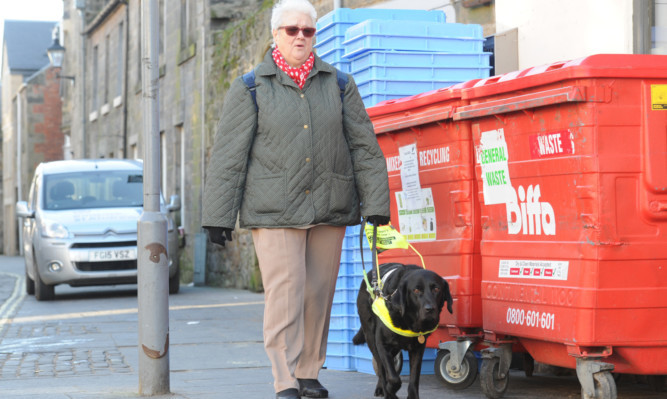Blind St Andrews resident Catherine Rowe was reduced to tears after she was almost knocked down by a car that mounted the pavement and parked on double yellow lines.
The 74-year-old widow was walking in the centre of town with her guide dog Aysha when the incident happened two years ago.
It inspired her to campaign locally for tougher action against illegal parking and obstructive street furniture.
Yet the problems continue and she is now backing a Scottish Government pledge for a change in the law to make parking on pavements illegal.
“I’m at the stage where enough is enough,” she told The Courier.
“I had another altercation yesterday with a delivery driver. I was so upset I was crying. My dog was crying. A-boards are one thing. It’s like an obstacle course. But I regularly have problems with cars parked on pavements or on crossings, meaning my dog can’t find the kerb. Last summer Aysha was bruised when a car shot forward and hit her. Delivery vans and workmen are the worst. But when I’ve confronted some drivers in the past I’ve been sworn at. People can be so selfish.”
A St Andrean born and raised who returned to the town a few years ago, Catherine suffers from a hereditary eye condition and has no sight in her right eye and only 2% sight in her left eye.
Registered blind for five years, she has been assisted by Aysha for six years.
Fife Council has stressed that its parking attendants patrol St Andrews on a daily basis and regularly issue fixed penalty notices to drivers parked illegally, which includes parking on double yellow lines. Incidents that involve dangerous driving should be passed to the police.
But according to Jane Horsburgh, policy manager at Guide Dogs Scotland, it’s a national problem that requires firm legislation. She said: ““Inconsiderate parking forces pedestrians onto the road and into the path of vehicles. It’s a major barrier for people with sight loss, and those with reduced mobility.”
Guide Dogs Scotland is supporting the Footway Parking and Double Parking (Scotland) Bill, as it “provides Scottish legislation that enables local authorities to take action against inconsiderate parking stopping people from getting around their communities.”
The bill was introduced by Glasgow Kelvin SNP MSP Sandra White on May 21 2015 and has been going through its Stage 1 scrutiny. The Scottish Parliament’s Local Government and Regeneration Committee held evidence sessions on November 25 and December 2 2015. The committee published its report on Ms White’s Bill on Monday February 8. MSPs welcomed the bill as a “positive step” that would help disabled people and young families. It has now called for more detail on how the bill would work in practice.
A Stage 1 Debate in the Scottish Parliament is scheduled to take place on March 1, in which the Scottish Government will reiterate its support to the general principles of the bill and its commitment to progressing a bill on responsible parking in the next parliamentary session.
And yet despite the Scottish government’s pledge to push ahead with legislation to make it an offence to park on pavements, a dispute has continued over whether Holyrood has the power to change the law.
Talks, held between the Westminster and Holyrood governments, have discussed giving MSPs power to change the law on the subject.
It’s a move welcomed by the charity Living Streets Scotland which has been campaigning to make Scotland’s streets safer for 85 years.
It is urging Westminster to transfer powers over pavement parking to the Scottish government without further delay.
In response to a recent Labour amendment to the Scotland Bill, Lord Dunlop assured interested parties in the House of Lords that Westminster is actively considering the amendment and that a decision on it will be made swiftly.
If included, this clause will ensure that offences in relation to parking on pavements, at dropped kerbs and double parking can finally be enforced by the Scottish Parliament.
Stuart Hay, Director of Living Streets Scotland said: “This is the clearest signal yet that the UK and Scottish governments are working together on measures to devolve powers related to pavement parking to Scotland. This has been a long time coming.
“It remains unacceptable that a legislative loophole continues to hinder action to protect disabled and older people from pavement parking. We hope to see an amendment to the Scotland Bill, or an equivalent order to resolve the issue, before the current session of the Scottish Parliament ends in March. This will in turn allow the process of giving Police Scotland and councils the power they need to keep Scotland’s pavements clear of obstructions.”
A Transport Scotland spokeswoman said: “The Scottish Government supports the general principles of Sandra White’s Bill as removing obstructions from our pavements to assist vulnerable groups aligns with our key strategic transport objective of improving quality, accessibility and affordable transport as set out in the National Transport Strategy.
“Once the legislative competence issues associated with this bill are resolved later this year, the Scottish Government is intending to progress a bill on this subject area in the next parliamentary session.”
